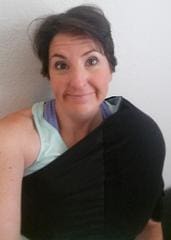 Two weeks ago I flew over my handlebars at 20 mph, landing superman style on the concrete bike path. It was a combination of bad timing and bad luck and 100% my fault. My bike miraculously is ok, save a few scuffs to my brakes and shifters. My bones are ok. I had some sweet road rash that’s fortunately all healed now, thanks to Tegaderm and Duoderm (this should be in every cyclist’s first aid kit). But my poor left shoulder… I have a 1 cm full thickness partial tear of my supraspinatus muscle of my rotator cuff. This means no bikes rides for a while (especially outside) and 8 weeks of no swimming. I’m a swimmer and this will be my longest time out of the water in 10 years. Oh, and I have a bunch of races scheduled.
Two weeks ago I flew over my handlebars at 20 mph, landing superman style on the concrete bike path. It was a combination of bad timing and bad luck and 100% my fault. My bike miraculously is ok, save a few scuffs to my brakes and shifters. My bones are ok. I had some sweet road rash that’s fortunately all healed now, thanks to Tegaderm and Duoderm (this should be in every cyclist’s first aid kit). But my poor left shoulder… I have a 1 cm full thickness partial tear of my supraspinatus muscle of my rotator cuff. This means no bikes rides for a while (especially outside) and 8 weeks of no swimming. I’m a swimmer and this will be my longest time out of the water in 10 years. Oh, and I have a bunch of races scheduled.
The physical injury and healing process is one thing, but I find that the hardest part of being injured is the emotional healing. Like most athletes, I was going a bazillion miles per hour, with a full training and racing schedule and was met with very sudden literal and physical stop. Riding for 30 minutes on the trainer is presently a touch too much for my shoulder. No swimming. Thank goodness I can run. And like most athletes, I’m very Type A and need some sorts of schedule or plan or something. Which is hard, since I’m not sure if I can actually do my races that I have planned at the end of the summer. So here’s some tips on how to emotionally recover from a sudden stop forced by injury.
* Don’t play the “what if” game. You got injured. It happened. Now you need to accept it and move forward.
* Your “training plan” consists of healing. Take those supplements, do that PT, don’t overdo things, and sleep. It’s similar to recovery techniques you utilize for training, so instead of saying to yourself “I’m hurt and on the couch, my life suuucks” say “I’m actively recovering”. A little mental tweak, but it helps.
* Reach out to race directors well in advance of your race and see if you can make some changes. I’m fortunate that my races are all locally organized. I’ve swapped my early August Xterra from a tri to a duathlon (hopefully I can ride my MTB by then…..). I can switch my Buffalo Creek Xterra from a solo entry to a relay. And I can either downgrade my 106 Deg West from the 70.6 to the Olympic-distance race or defer to 2017. Be up front and honest about your situation and chances are, you’ll get some flexibility. But the key is to communicate your situation well in advance. If you email the RD a week prior to the event, chances are you’ll be stuck.
* Find something else to focus on while you heal. Fortunately for me, I’m a triathlon coach and I’m President of Altitude Multisport. So instead of working out, I’m leading workouts and coaching. If you don’t have something like that going on, plan a fun weekend getaway or focus
on a project that has been neglected for a while. In other words, find something that can take your time up since you won’t be training.
* Indulge in some retail therapy. I got some cute new running shorts, so I can coach Tuesday AMC Track Night in style.
* Spectate and volunteer at races. Several races in the Denver area offer discounts on future races to volunteers. This is a way to give back to your racing community, get out of the house, and get a sweet discount for a future race that you can do when you’re healed up.
* Try to have a sense of humor. I was joking to my husband that “Injured Erin = Fun Erin”, only in that I have time now to go and drink beer and do fun things since I’m not swimbikerunning in my free time. Thank goodness I can still do beer curls with my good arm. But seriously, planning some fun, non-athletic things with people that you like to hang out with is a very good thing to do.
* Finally, be very forgiving of yourself. Forgiving of the dumb thing you did get injured. Forgiving of being in pain. Forgiving of the time it takes to heal. The easier you are on yourself, the better your recovery will be.
Happy healing!
Guest blogger,
Erin Trail
